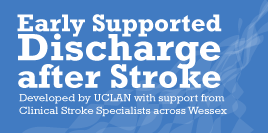 |
About Early Supported Discharge |
This section includes a number of recommendations relating to ESD from the National Clinical Guideline for Stroke (2012), National Stroke Strategy (2007) and the House of Commons Committee of Public Accounts: Progress in improving stroke care (2010).
Recommendation 3.2.1 (p29)
All patients discharged home directly after acute treatment but with residual problems should be followed up by specialist stroke rehabilitation services.
Recommendation 3.7.1 (p33)
Patients should only be discharged early (before the end of acute rehabilitation) if there is a stroke specialist rehabilitation team able to continue rehabilitation in the community from the day of transfer and if the patient is able to transfer safely from bed to chair, and if other problems can be safely managed at home.
Recommendation 3.7.1 (p34)
Patients should not be discharged early from hospital to generic (non-specialist) community services (including both home and community hospitals) unless there is continuing active involvement by the specialist stroke service.
Recommendation 2.2.1 (p22)
Domiciliary rehabilitation services should be commissioned as part of an early supported discharge team to deliver specialist rehabilitation at home in liaison with inpatient services as well as in the long term.
Quality Marker 10 (p36)
Rehabilitation after stroke works. Specialist co-ordinated rehabilitation, started early after stroke and provided with sufficient intensity, reduces mortality and long-term disability. Early rehabilitation is effective when provided in specialist stroke units, or as part of properly organised early supported discharge and longer-term support in the community, according to need.
Early supported discharge (ESD) to a comprehensive stroke specialist and multidisciplinary team (which includes social care) in the community, but with a similar level of intensity to stroke unit care, can reduce long-term mortality and institutionalisation rates for up to 50% of patients and lower overall costs. The focus should be on those patients who will most benefit; premature discharge to inadequate community facilities is likely to increase individuals' long-term dependency and therefore reduce the immediate savings achieved through a shorter length of stay.
Quality Marker 18 (p53)
High quality care and services to people with stroke or at risk of stroke should be delivered by inter-professional and inter-agency teams who are competent in their own roles and have stroke expertise, understand the roles of others and their key activities, and are able to support activities of other staff when required. This applies to all practitioners in all of the different settings relevant to stroke and at all stages of the stroke care pathway.
Response to the 2010 National Audit Office Report (p5)
Not enough hospitals arrange early supported discharge for stroke patients, even though it provides better outcomes for many patients and can save money. The Department should ask commissioners across the health service to develop business cases for introducing or increasing the use of early supported discharge and should report back to us on the progress it has made within 12 months.
 |